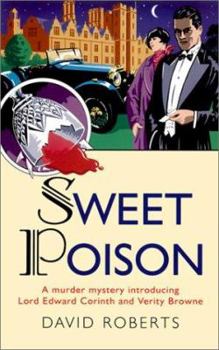Sweet Poison
(Book #1 in the Lord Edward Corinth & Verity Browne Series)
Select Format
Select Condition 
Book Overview
Death comes to dinner at the Duke of Mersham's, and so does a confidant of the new German chancellor Adolf Hitler, in this ingeniously crafted mystery novel set against the background of Anglo-German relations in the summer of 1935. Among the other guests at the duke's influential table are a pacifist bishop, a womanizing politician, a Canadian press lord and his troublesome daughter, and one of the duke's oldest friends -- a man vehemently opposed to any accommodation on the part of the English to Hitler's regime -- General Sir Alistair Craig VC. It is over the duke's excellent port that death strikes first, when the general may have mistaken a cyanide pill for his medication.The mystery behind the general's unanticipated death intrigues and challenges both Lord Edward Corinth, the duke's younger brother, and Verity Brown, a resourceful young journalist who has come to interview the duchess supposedly for Country Life but in reality for the communist Daily Worker. An unlikely pair, this scion of the aristocracy and young woman passionately committed to social justice cross their class lines and combine their considerable resources to uncover the cause of Sir Alistair's death -- only to discover that virtually every guest, and the duke himself, had reason to want the general dead.Death meanwhile strikes again. And again. And this shrewd whodunit will keep readers guessing to the very end.
Format:Hardcover
Language:English
ISBN:0786708190
ISBN13:9780786708192
Release Date:February 2000
Publisher:Carroll & Graf Publishers
Length:277 Pages
Weight:1.06 lbs.
Dimensions:1.1" x 5.6" x 8.8"
Customer Reviews
2 ratings
No comparisons necessary --
Published by Thriftbooks.com User , 24 years ago
Comparing a book by one author to any book by any other author is always a dilemma. If the comparison is to an author the reader likes -- fine and dandy. But if it's one not so well-liked, then the risk is very real - quite possibly a reader lost for no very good reason. It's true, of course, that any period English-set mystery will conjure up mental images of earlier creations, but really, any book needs to stand on its own merits--and this one is well able to do just that. Granted, Lord Edward Corinth is the younger brother of a Duke, as is Lord Peter Wimsey, but from there on, Edward is very much his own man. Hardly anyone does (or has done) period detail better than Dame Agatha Christie (in my own opinion, that is) but David Roberts has done an excellent job in recreating that period of England, between the two wars. At least I think he has, not having been there at that time myself, it being slightly before my time. Regardless of that, the writing is smooth and it's very obvious that a lot of research was done to acquire the wealth of period detail that is disbursed so credibly. Edward's older brother, the Duke of Mersham (who inherited the title only because his older brother was killed in the first war) believes strongly that war is a giant waste of everything, and he believes he can help to avoid the possibility of another war. To this end, he invites several disparate persons to a dinner at his country home--Mersham Castle. There is the retired general, the press lord, the pacifist bishop, a politician, a distant German cousin and now diplomat, and Edward. These men will talk as civilised men do, in an effort to calm the rising hysteria. Edward's sole task was to squire the step-daughter of the press lord, but rushing to the castle in his Lagonda, he runs afoul of a huge haywagon, and finds himself in the ditch. He is rescued by a dashing young woman, Verity Browne, who just happens to be a journalist on her way to the castle to interview the Duchess. The two of them arrive at the castle just in time to witness the death of the general, and the further horror of reading all about it in the next mornings newspapers. From there, chaos ensues, and Edward finds himself strangely drawn to Verity as they work together to discover the truth. There will be more deaths as layer after layer of society is peeled back to reveal the truths previously unsuspected. During all of this, Verity is unmasked as a young communist, sincere if a bit mis-guided in her loyalties, whereas Edward is complex and chivalrous, in spite of himself. You will have no trouble imagining yourself in 1935 London, as you travel its streets and nightclubs with Edward and Verity. The characters are well-drawn, likeable or not as the plot requires. The plot itself is not your ordinary one, but very workable. Justice is served in the end, and if not in an ordinary way, it is a mostly satisfying ending, clearly leaving the way open for a sequel or two or three. I'd be very happy
Reminiscent of Lord Peter
Published by Thriftbooks.com User , 24 years ago
I wasn't sure I'd enjoy this book as it was so clearly a form of homage to the Lord Peter books. Lord Edward Corinth has much the same personality (although he lacks the monocle)as Sayers' sleuth. He has the both the sensitivity as well as the intellect hidden behind the foppish exterior. Miss Verity Browne is plausible as a potential companion but is by no means a copy of Harriet Vane. She's younger and somewhat more naive. The story kept me interested and the writing had only one or two truly obvious errors in terms of the times and manners of the day. But fans of the period will enjoy this well-balanced depiction.






